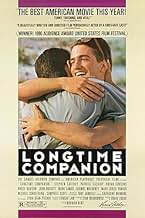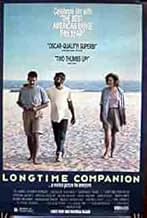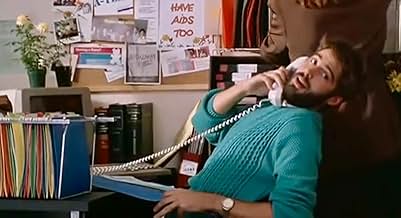ÉVALUATION IMDb
7,5/10
6,4 k
MA NOTE
Ajouter une intrigue dans votre langueThe emergence and devastation of the AIDS epidemic is chronicled in the lives of several gay men living during the 1980s.The emergence and devastation of the AIDS epidemic is chronicled in the lives of several gay men living during the 1980s.The emergence and devastation of the AIDS epidemic is chronicled in the lives of several gay men living during the 1980s.
- Nommé pour 1 oscar
- 6 victoires et 6 nominations au total
Avis en vedette
When I watched this for the first time, I like many that went through this time period, identified with most of the characters in this movie at one time or another. I had my sister watch this movie (a devoted Pentecostal) she said it was the sadist thing she had ever seen. I felt that she got the message, Gay or Straight, this was a tragedy that had happened to everyday people, and still is happening, and not just to "those people". She, like many, never wanted to see past the homosexual thing. With this film she saw a clip of life, albeit a condensed version, of how something so out of control entered, affected and was handled by people like herself both gay and straight. I told her that was the way it I felt it was for many of us dealing with this disease that had taken so many of my friends and colleagues. I also liked how this movie didn't victimize, or make a villain out of any of the characters nor did it make anyone a saint either. I felt the topic was handled with good taste, considering how it was something most people didn't want to think about. With the majority of the audience being straight and secure in the fact that this only happened to other people who were deserving of what they got. I also felt that this movie showed the truth although a bit Hollywood and too polished (not a docudrama, definitely a movie) it did a good job of making a difficult subject much more palatable and sympathetic to folks that had never had it happen to them or to those they love. The progression of the movie conveyed the feeling most had in regards to how fast things happened. One day someone was here the next they were gone. I also felt that the actors, many non gay, did brilliant performances not playing stereotype's but keeping it real as it should be. Since most gay men and women I know don't act all that different from everyone else. I for one am tired of gays being portrayed as only hair stylist and drag queens, much as I am sure African-Americans were tired of their stereotypes of only being the hired help or as ignorant simpletons. This was not the best movie I have ever seen, but I feel it is one of the best dealing with this subject matter. The end of this movie still gets to me, every time I see it, if only that could happen like that, I too "just want to be there"
Blondie's hit record opens this early AIDS film, a kneejerk reaction to the hysteria that was happening in the world in the wake of so many deaths from what was still viewed as 'the gay plague'.
'Longtime Companion' centres on a group of friends who are affected by AIDS in various different ways - two are victims of the disease, while others survive to remember their friends with affection. There are one or two stereotypes here (the camp Fuzzy, who mimes to disco records), but in the main the characters are played with sensitivity (and a degree of humour): Bruce Davison, Mark Lamos, and Campbell Scott stand out from a good cast.
I particularly liked the moving and celebratory ending, a surreal segue which brings everyone together in a huge, joyous beach party where everyone is alive, in love, and together. This single scene says more about the effects of the AIDS epidemic than many other right-on scenes from more traditional films.
'Longtime Companion' centres on a group of friends who are affected by AIDS in various different ways - two are victims of the disease, while others survive to remember their friends with affection. There are one or two stereotypes here (the camp Fuzzy, who mimes to disco records), but in the main the characters are played with sensitivity (and a degree of humour): Bruce Davison, Mark Lamos, and Campbell Scott stand out from a good cast.
I particularly liked the moving and celebratory ending, a surreal segue which brings everyone together in a huge, joyous beach party where everyone is alive, in love, and together. This single scene says more about the effects of the AIDS epidemic than many other right-on scenes from more traditional films.
As the famous Blondie ballad The Tide Is High opens Longtime Companions the song got me thinking. The Tide was high for LGBT people in 1981 as we began winning more and more battles for civil rights ordinances in various municipalities across the country. Then life and the tide ebbed radically as a bisexual man brought a virus over from Africa that had been decimating population on that continent and it spread like a prairie fire amongst us. Longtime Companions focuses on the intertwining lives of several gay men and how the plague virus affected both the infected and those around them.
I lost so many people in the next 15 or so years I feel like an Ishmael at times, left alive to tell the tale. That's what Longtime Companions does, it tells the tale of the loss of so much from the most famous names of all like Rock Hudson to the most insignificant in the cosmic scheme of things. How much art, music, science, human freedom, name the field could have advanced if these people had lived their allotted normal lifespan. Those who survived and especially those who worked in the field have a responsibility to be Ishmaels.
Longtime Companions boasts a great ensemble cast that functions like a well tuned Rolex watch. Some of my favorites are Patrick Cassidy the soap opera hunk who loses his job and eventually his fight for life. Campbell Scott who throws himself into the fight after losing his Longtime Companion. Most of all lovers Bruce Davison and Mark Lamos and there will be no dry eyes as you see Davison guide Lamos from one world to the next.
Two things standout for me in the Eighties which decade this film covers about AIDS. The first was in 1983 and my first exposure to someone with the virus. In my working life with New York State Crime Victims Board and after I had come out at work, I got a call from a bedridden man in Tribeca whose home health attendant had just robbed him blind of everything and he called us because the cops at New York's 1st precinct refused to go to even take the report. As our office was downtown and my dear friend Ermano Stingo lived there as well, we both went to this man's flat, a rather dingy place overlooking the Hudson River that was pretty well emptied of most of what was there save this bedridden man with lesions going into his last stage of life. Sad to say both of us saw that sight a lot more over the next decade. I filled out my paper work for a claim, witnessed his signature and Ermano went to the 1st precinct to file the report on the victim's behalf. To this day I wish I could recall his name, but Ermano is also now in another world.
The second thing was the hearings for the New York City gay civil rights law. At the many forums the City Council gave us and our opposition to testify for the bill, I remember a lot of the homophobes walking in with surgical masks covering their faces as if that would prevent them from catching the disease from the opposition which they all assumed were sufferers or carriers. How ignorant they were and still are and worse how they did not want to be dissuaded from their firmly held beliefs. A frightening time for all.
To understand AIDS and its impact on LGBT people and society as well you have to see Longtime Companions. And this review is dedicated to both my claimant in the Tribeca flat and to the first person that I knew that died of AIDS, a bartender named Bobby Lynn who worked in a long since gone gay bar in Brooklyn Heights.
I lost so many people in the next 15 or so years I feel like an Ishmael at times, left alive to tell the tale. That's what Longtime Companions does, it tells the tale of the loss of so much from the most famous names of all like Rock Hudson to the most insignificant in the cosmic scheme of things. How much art, music, science, human freedom, name the field could have advanced if these people had lived their allotted normal lifespan. Those who survived and especially those who worked in the field have a responsibility to be Ishmaels.
Longtime Companions boasts a great ensemble cast that functions like a well tuned Rolex watch. Some of my favorites are Patrick Cassidy the soap opera hunk who loses his job and eventually his fight for life. Campbell Scott who throws himself into the fight after losing his Longtime Companion. Most of all lovers Bruce Davison and Mark Lamos and there will be no dry eyes as you see Davison guide Lamos from one world to the next.
Two things standout for me in the Eighties which decade this film covers about AIDS. The first was in 1983 and my first exposure to someone with the virus. In my working life with New York State Crime Victims Board and after I had come out at work, I got a call from a bedridden man in Tribeca whose home health attendant had just robbed him blind of everything and he called us because the cops at New York's 1st precinct refused to go to even take the report. As our office was downtown and my dear friend Ermano Stingo lived there as well, we both went to this man's flat, a rather dingy place overlooking the Hudson River that was pretty well emptied of most of what was there save this bedridden man with lesions going into his last stage of life. Sad to say both of us saw that sight a lot more over the next decade. I filled out my paper work for a claim, witnessed his signature and Ermano went to the 1st precinct to file the report on the victim's behalf. To this day I wish I could recall his name, but Ermano is also now in another world.
The second thing was the hearings for the New York City gay civil rights law. At the many forums the City Council gave us and our opposition to testify for the bill, I remember a lot of the homophobes walking in with surgical masks covering their faces as if that would prevent them from catching the disease from the opposition which they all assumed were sufferers or carriers. How ignorant they were and still are and worse how they did not want to be dissuaded from their firmly held beliefs. A frightening time for all.
To understand AIDS and its impact on LGBT people and society as well you have to see Longtime Companions. And this review is dedicated to both my claimant in the Tribeca flat and to the first person that I knew that died of AIDS, a bartender named Bobby Lynn who worked in a long since gone gay bar in Brooklyn Heights.
A landmark film, not only in that it is the first film to deal with the AIDS crisis, but also in its portrayal of gay men and their friends. Sitting on the cusp between earlier depictions of gays as murderous or suicidal and later caricatures of funny, sexless "best friends", the men shown here are very real and very honest in their decade long struggle with death and illness. I defy you to watch Bruce Davison's heartbreaking farewell speech and not be choked up on some level of emotion. And Mary Louise Parker add a special touche. This movie has arguably the greatest final scene in gay cinema.
I was a physician in New York City from 1989 until 1992, and saw a tremendous number of people with AIDS. I feel that this movie, although it may appear to be dated, is an excellent portrayl of events that were all too common at that time. It gives a good sense of the confusion, misinformation, sense of being lost, and of not knowing what to do for those suffering and for their friends and companions. The actors did an excellent job in showing this. I believe that this movie is still important and merits being shown often.
Le saviez-vous
- AnecdotesThe title refers to the only way that newspapers at the time would allow a gay man's lover to be listed in an obituary.
Meilleurs choix
Connectez-vous pour évaluer et surveiller les recommandations personnalisées
Détails
- Date de sortie
- Pays d’origine
- Langue
- Aussi connu sous le nom de
- Longtime Companion
- Lieux de tournage
- sociétés de production
- Consultez plus de crédits d'entreprise sur IMDbPro
Box-office
- Budget
- 3 000 000 $ US (estimation)
- Brut – États-Unis et Canada
- 4 609 953 $ US
- Fin de semaine d'ouverture – États-Unis et Canada
- 50 525 $ US
- 13 mai 1990
- Brut – à l'échelle mondiale
- 4 609 953 $ US
Contribuer à cette page
Suggérer une modification ou ajouter du contenu manquant

Lacune principale
By what name was Un compagnon de longue date (1989) officially released in India in English?
Répondre

































